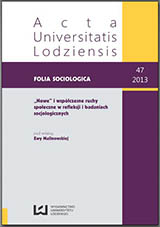RUCH WSPARCIA DLA „SOLIDARNOŚCI” I POLSKI W LATACH 80. JAKO RUCH SPOŁECZNY
HELP AND SUPPORT TO POLAND AND “SOLIDARITY” THROUGHOUT THE 1980S AS A SOCIAL MOVEMENT
Author(s): Marcin FrybesSubject(s): Social Sciences
Published by: Wydawnictwo Uniwersytetu Łódzkiego
Keywords: Poland; Solidarity; Western World; Communism; Trade Unions; social movement; Touraine; France; United States
Summary/Abstract: The beginnings of “Solidarity” in 1980 were accompanied by emotions and great interest throughout the world. In the 15 months of its legal existence, “Solidarity” became a sym- bol of freedom and the struggle for recognizing human subjectivity without resorting to violence. Various circles in the West had high hopes and much diversified expectations connected with “Soli- darity”. The imposition of martial law in Poland met with universal condemnation. In the place of a few thousand interned leaders of the “Solidarity” movement, who in the eyes of the authorities of the Polish People’s Republic constituted a mortal danger for the communist system, in various countries of the world, there appeared at least an equal number of very determined “friends of Soli- darity” (union activists, journalists, intellectuals, lecturers, students, and Polish émigrés of different generations, including dissidents and activists of Polish democratic resistance and the “Solidarity Trade Union” members who were at the time abroad). The actions undertaken by them throughout the 1980s composed a transnational movement of support and unity with Poland and “Solidarity”. When analyzing it in the category of a social movement, in the meaning attributed to such a phe- nomenon by the French sociologist Alain Touraine, the most important dimension of it was its influence on what Touraine defines as “cultural model”, which in turn influences directly the sphere of politics. The support movement for “Solidarity” in particular contributed to the eventual delegiti- mizing of the communist project, to creating a new language capable of describing social phenome- na in the countries of the former Soviet bloc, as well as to authenticating Polish (and not only Polish) dissident movements as a possible and definitely real democratic alternative to the communist apparatchiks governing the state. The movement has brought very definitive results not only in the sphere of culture but also in politics and, partially, also geopolitics.
Journal: Acta Universitatis Lodziensis. Folia Sociologica
- Issue Year: 2013
- Issue No: 47
- Page Range: 51-71
- Page Count: 21
- Language: Polish

